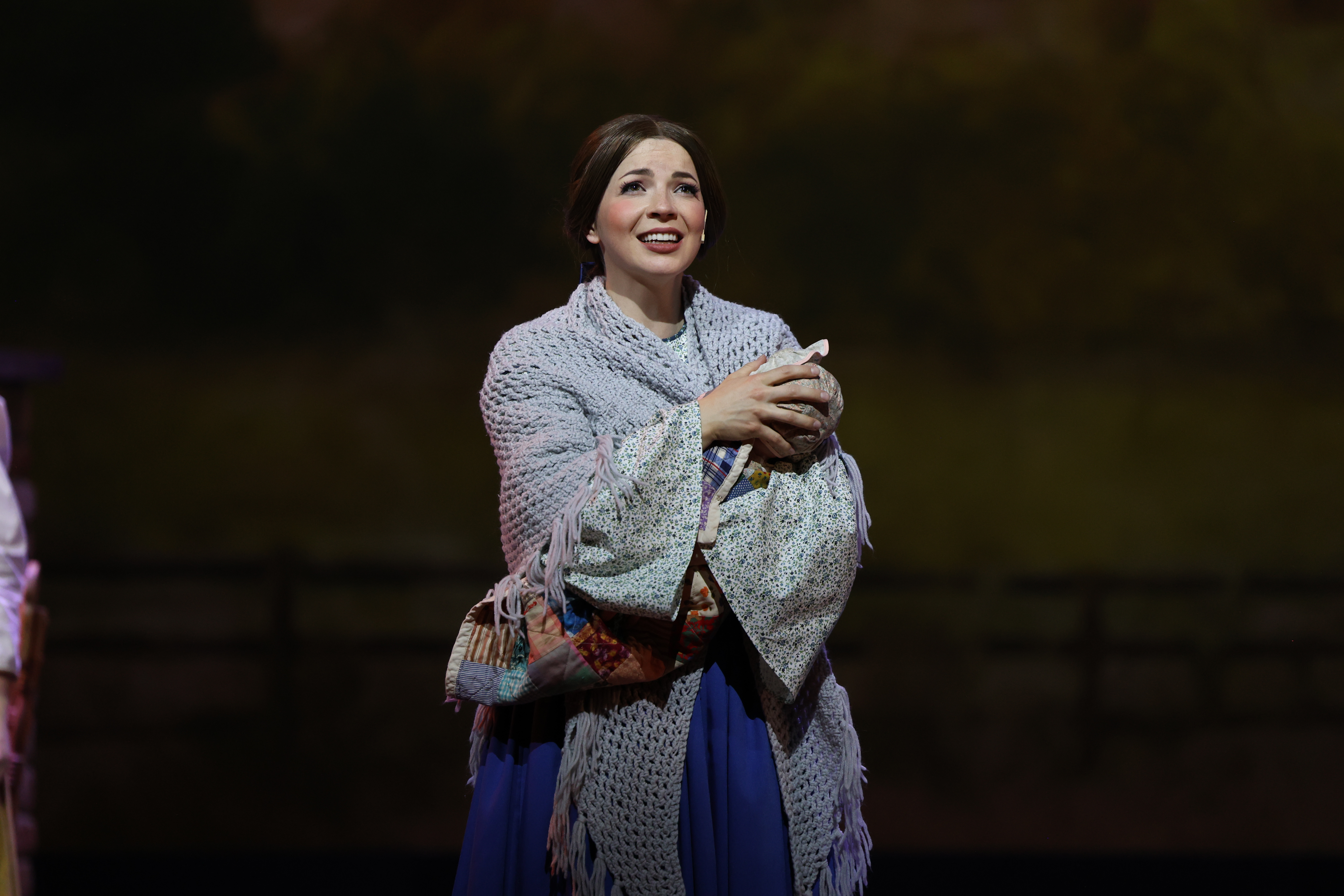The Principle Wife• July 22, 2023• Cover Center for the Arts
Reviewed by Kevin Rolfe
*This review contains spoilers. If you’re planning on seeing The Principle Wife come back and read this after you’ve seen it. Otherwise, you may proceed.*
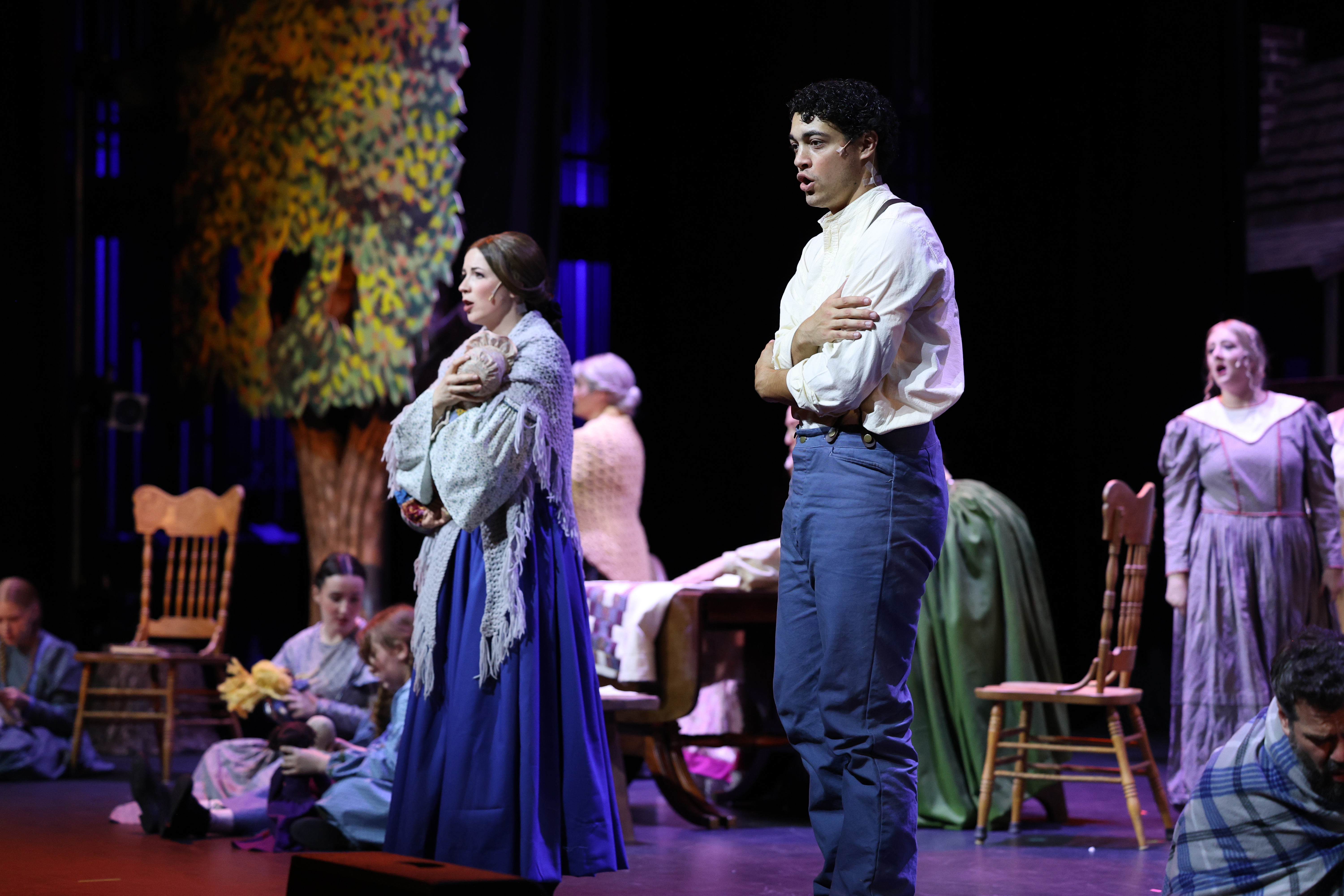
I saw the billboards, I’ve seen the social media ads, and I thought, ‘Is this a musical about polygamy?’ Then I received an email with an invitation to review the production of The Principle Wife. So I read up on it and sure enough, it is. I’m sure many of you might be thinking, why would anyone write a musical about polygamy, why would Kevin go review a musical about polygamy, and do we need a musical about polygamy, are people wanting this? I’ll do my best to answer those questions.
I’ll answer the second question first. The question of why would anyone write this, and if we need it intrigued me. Is this musical trying to justify plural marriage practiced in the earlier days of The Church of Jesus Christ of Latter-Day Saints? Is it trying to show how difficult it was for the women and men who were asked to participate in this? I had so many questions. I knew the only way to get answers was to attend this production myself. So when I received the invitation, I had to accept.

From the press release…
Set in Southern Utah in the late 1800s, The Principle Wife centers around the love story of Rebecca and Benjamin as they embark on a journey of living “the principle” known as plural marriage. At a time when they face severe difficulty and uncertainty, could adding more members to the household really be the answer? Observe as three women forge an unlikely sisterhood to build a family with strength and resilience.
I had never been to the Covey Center for the Arts before. It’s a beautiful place in the heart of Center Street in Provo. It was an excellent performance space for this production. I attended the Saturday afternoon matinee. I was really impressed by the turnout for a matinee show on Pioneer Day weekend. There was an engaged crowd in attendance and it seemed that many of them really enjoyed the show. I was worried that going to a matinee might not give me the full effect of the production. But with the solid attendance and the attentive crowd, I think it was an excellent setting to see this show.
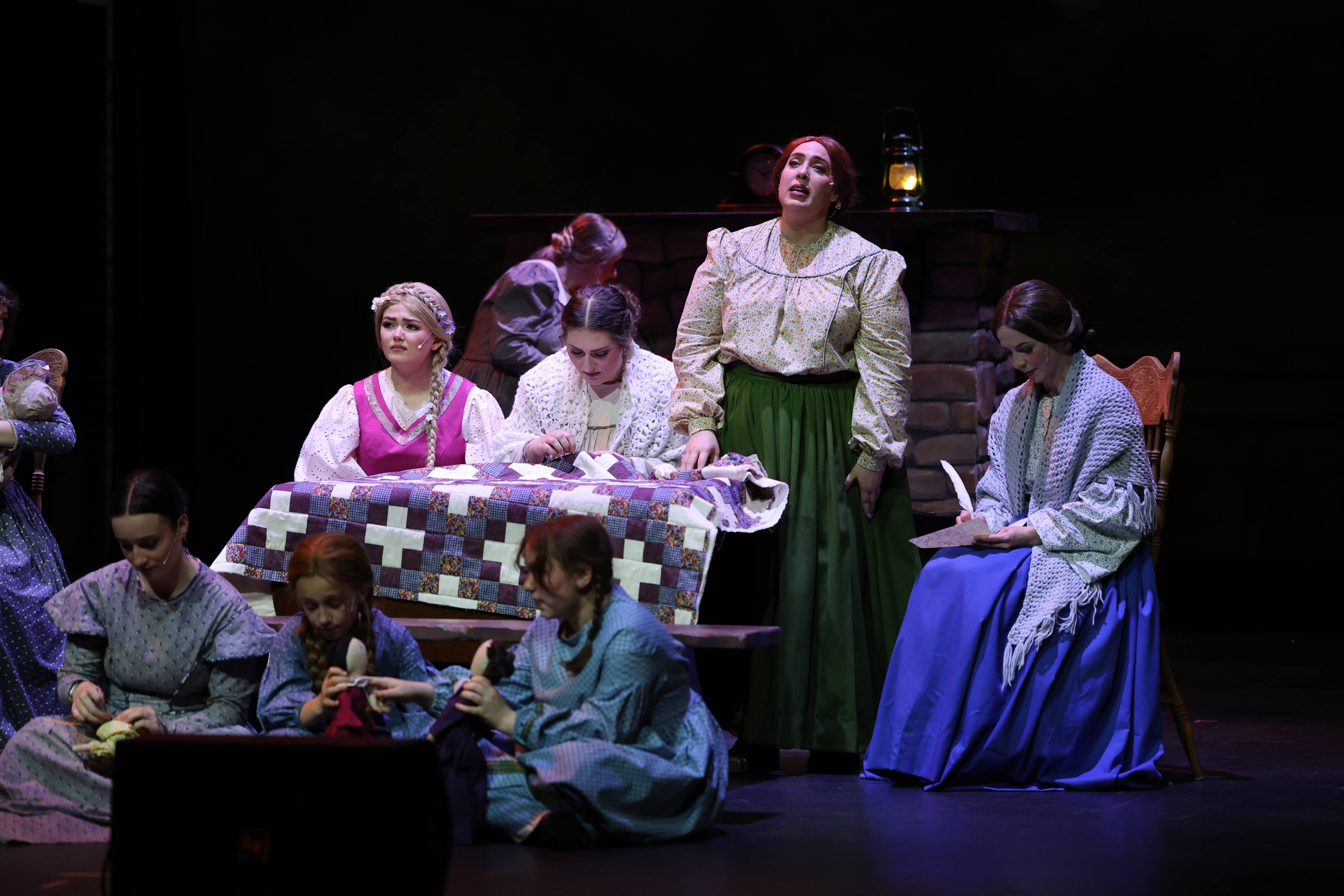
The staging was simple, but effectively so. Set pieces and props moved to their proper position seamlessly. The production as a whole had a nice flow and I think a large part of that was due to the smooth transitions from scene to scene. The backdrop of Southern Utah was a work of art. It gave the entire stage a look that brought the audience into the time and place of the show.
I thought the casting of this musical was excellent. Twyla Wilson as Rebecca, the leading role brought so much to her performance. This is not an easy role to play. She’s the first or “Principle” wife of Benjamin played by Ethan Kelso. She has to go from being married with a young family to bringing on not one but two wives and families into hers. The emotional roller coaster that must have been for a woman back in the 1800s is not something that I, a man, can fully comprehend. Wilson did an amazing job of portraying what that might have been like. It was heart-wrenching at times, and in many ways inspiring to see her rely on her faith time and time again to go forward with something she believed was being asked of her by God.
Twyla Wilson gave Rebecca a relatable disposition to take us to a place that is unfamiliar to us in the modern day, a woman accepting and practicing polygamy. Her singing voice added another enjoyable element to Twyla’s performance. Whether she was singing an emotional solo, in a duet, or big group number, her voice stood out. There is no doubt that she was the right actor for this role.
Ethan Kelso had the unenviable task of playing the husband, Benjamin in this production. I say unenviable because try as this production might to portray Benjamin as a man not wanting to be a polygamist, when he ultimately does take a second wife, it still feels weird. Kelso did a solid job building chemistry with his other wives (A sentence I never thought I’d write ever!) while leaving no doubt that his true love was Rebecca. I thought Ethan Kelso had an amazing vocal range, and the emotion in his voice gave the audience perspective on the difficulty of the entire situation.
Erin Wilson, who played the brash, boisterous, and uncouth second wife, Sarah often provided comic relief in what might be otherwise uncomfortable moments. Wilson gave us another perspective on what it might be like to be a second wife. What it might be like to try to fit into an already established situation. I thought she did a really good job of coming in very strong and then enduring herself to the audience as not only a powerful woman but one with insights on the way to make a new family work.

I don’t think we got to see enough of Mattie Grace, who plays the third wife, Elsa. She appears in the second act where there has already been so much established that her storyline just has to fit into what’s already happening. Which might have been what it was like to be a third wife. I wish we had more time to see her story develop. Not that I think this production should be longer. But maybe she should appear in the first act. Grace was also a great vocalist, and I enjoyed her take on the character.
The entire cast was solid. I thought their vocals were strong, their stage presence had purpose and meaning, and they filled out the show nicely. I never felt like there was a weak link or dropoff in talent. Everyone was on their game and I thought they all did a very good job.
It’s always interesting when we hear the story of plural marriage in Utah because the “villain” in the story is usually the United States. It plays with one’s head because we’re a state, and a patriotic one at that. So to see the US represented as the antagonist feels strange. On one hand, I get what they were doing. They were establishing and forcing a law that I think most people are cool with today. On the other, I can see the challenges of having someone come in and challenge a religious practice. At the center of it all is Erastus, played by John Donavan Wilson. It wasn’t until after the show that I learned he was the spouse of Twyla Wilson. Looking back on their scenes together, as their characters play past loves, something Erastus is trying to resurrect made for an unspoken intensity.
I feel like part of the answer to, “Why would anyone write a musical about this?” is to dispel some myths about polygamy in the LDS Church. This musical does a good job of showing that this practice no longer takes place in the church and hasn’t for a really long time. They also make sure the audience knows that it wasn’t every member of the church practicing polygamy but a small percentage. This is all helpful information, but I would argue not enough for those in and out of the faith to feel comfortable with this part of LDS history.
I think the other reason there is a desire to tell this story is so people understand how difficult it must have been, but also how the faithful members of the LDS Church who practiced polygamy found a way to make it work and become a family. The truth is there are many documented accounts of polygamists from those times that said they embraced the practice and ultimately preferred it. However, I have also seen enough accounts to the opposite. It’s a tricky thing to show the audience the balance of how difficult it was to accept and how good can come out of it. It borders on justifying polygamy and again there are some people who will just not like that. This fictional story portrays what I’d imagine was the best of scenarios in late 1800s polygamy.
Something that I was looking for in this production was modern context from a historical work. Some of the great musicals like Fiddler on the Roof, Miss Saigon, Hamilton, and South Pacific take place at a certain time in history, but give us a modern message. I wasn’t sure what that was in The Principle Wife. Or if there was one. There doesn’t necessarily need to be a modern message. But I was looking for one.
Was it supposed to be female empowerment? Because I hate to say it, one woman being told that her husband needed to take on two other wives and her agreeing to do so is not female empowerment. Two other women being told they’re going to be marrying a man who’s already married is not female empowerment. I wanted to know what the message of this musical was, and what we can learn from history in a modern context. I’m not sure I found that.
Yes, there are positives that can be drawn from this production. But it’s tricky because every time I felt a positive vibe or enjoyed a laugh, I couldn’t help be go back to the subject matter. And it’s just so difficult to put a positive spin on polygamy. At least one that most people can embrace.
I had a problem in some respects with how Sarah, the second wife was portrayed. She’s tough, bawdy, and crass. She’s in many ways the antithesis of Rebecca. It’s a great character to counter the more put-together first wife. This has nothing to do with how Erin Wilson portrayed the role. She was fantastic. But for the character to have to say, “I know I’m not pretty” or things of that nature feels wrong. Who says she’s not pretty? Is she conventional? No. Which again is great. But why the commentary on looks? Being a widower, we know she was already married. So someone thought she was pretty. And ultimately she has sex with her new husband Benjamin. So she must have been pretty enough for that.
I thought to focus on that felt off. Just like the emphasis on Elsa being pretty. It’s so objective and not relevant enough to the story. Were there people in the audience who thought, “Sarah is just my type”? Probably! It felt a little out of touch to have a character who has other identifiable characteristics that might cause issues with the new arrangement also have looks as part of what was wrong with her.
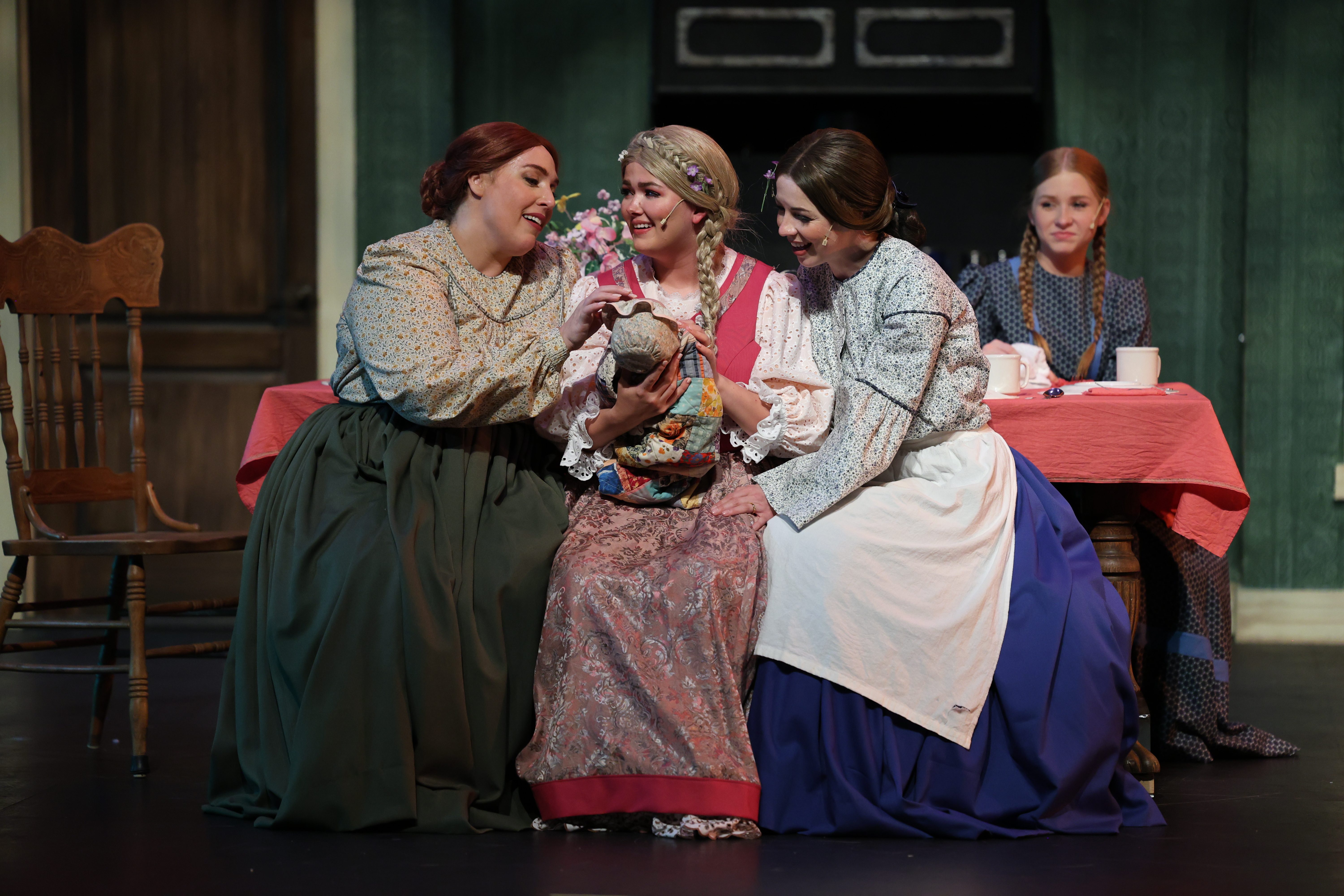
I have to hand it to the creators of this production though. They did not shy away from anything relating to this topic. This musical covers it all. Faith, jealousy, competitiveness, community, and yes, even sex. Does Benjamin have sex with his other wives? And how is that presented in the show? I don’t want to spill all the tea. But, yes. Yes, he does. It’s not salacious and the musical tries hard to cover that aspect of plural marriage in a respectful way. But I will say that the broaching of this topic in the musical is not one of the more comfortable moments in this production.
Is there a need for a musical like this? Are people wanting a musical about polygamy? I’m still not sure if I have a straightforward answer. I think there are some that would really enjoy this musical. I think they would see the effort to show just how difficult this was, but how faithful these people were. But to be honest, I know that there are people who would hate this. They already struggle with the Latter-Day Saint history of polygamy and this musical won’t help. I’m sure those who created The Principle Wife are already aware that this musical isn’t for everyone.



For me personally, it was too much to wrap my head around. I’m watching these women become close as if sisters. I’m watching each wife build chemistry with their husband. It’s all acted and portrayed really well. But, it’s polygamy. Am I supposed to be happy for them? Or just understand that this might have been how it went down? I’m just not sure. I just wasn’t able to fully get on board with this musical with the topic being what it is. Despite the quality of the production.
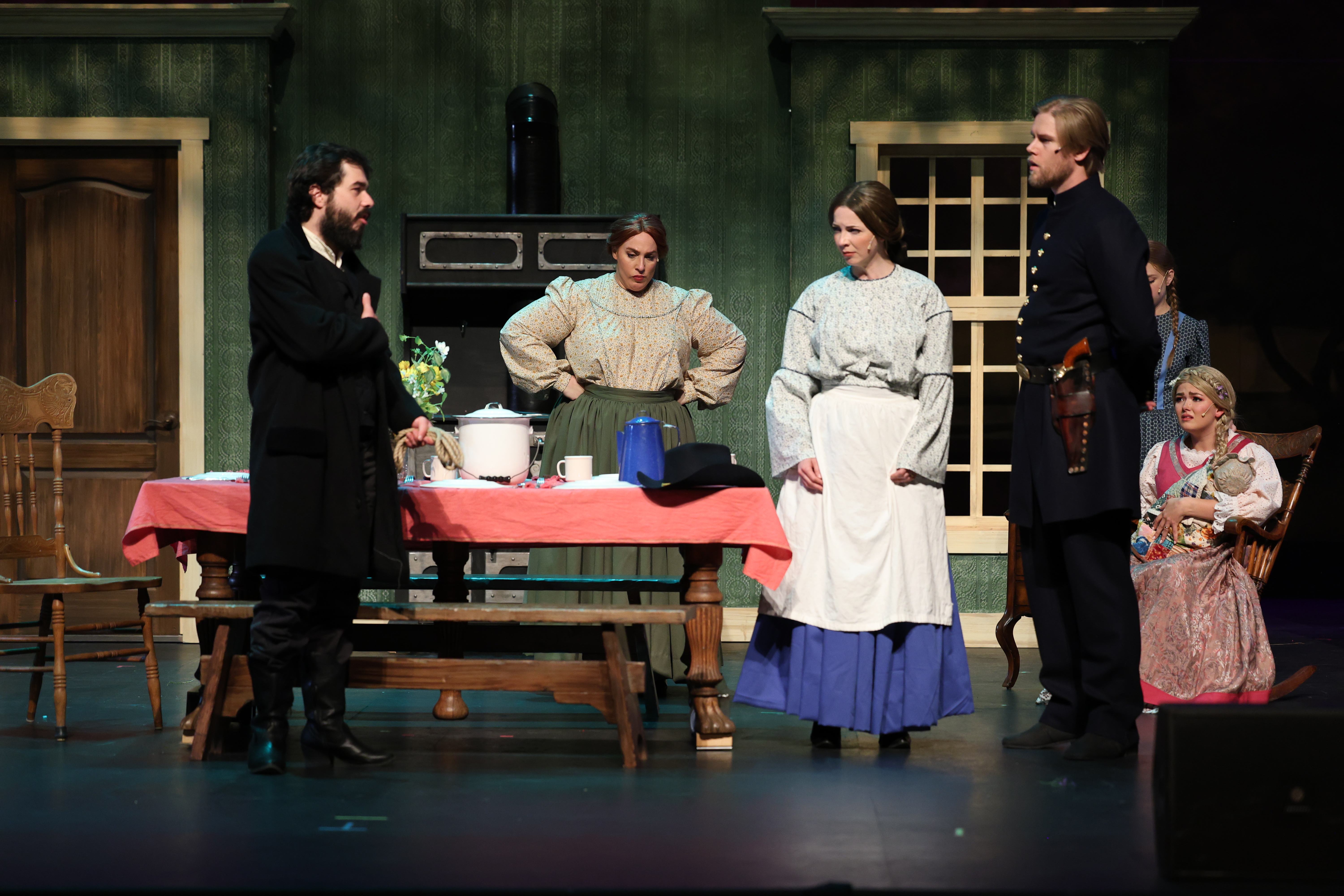
The Principle Wife is a really well-done production. I’m not sure if we need a musical about polygamy. But I commend the creators for their efforts to give us this look into what it may have been like in the late 1800s. This musical might not end years of awkward discussions on what many find an embarrassing chapter in the history of The Church of Jesus Christ of Latter-Day Saints, but it does give some real visual insight on the struggle and ultimate rising above the challenges in honoring their faith.
The Principle Wife runs at the Covey Center for the Performing Arts until July 31. To purchase tickets go to theprinciplewife.com

